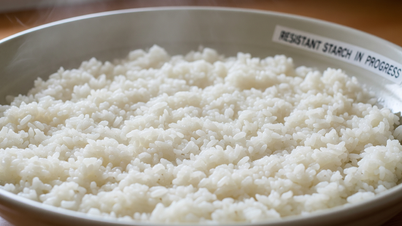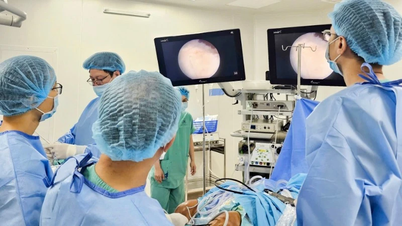To find out whether ginger consumption has an impact on inflammatory bowel disease, scientists at the University of Toronto (Canada) and their research team screened the chemical components of ginger for interactions with receptors related to inflammatory bowel disease (IBD).
The results discovered a compound in ginger that has the effect of reducing inflammation and repairing intestinal damage in IBD patients, thereby helping to treat inflammatory bowel disease naturally.

Scientists have discovered a compound in ginger that reduces inflammation and repairs intestinal damage in patients with inflammatory bowel disease.
Photo: AI
Specifically, they identified the compound furanodienone (FDN) in ginger that has the ability to strongly bind to the pregnane X receptor (PXR). This interaction helps reduce colitis by enhancing PXR's ability to inhibit the production of inflammatory cytokines, according to the science news site ScitechDaily.
This discovery highlights the potential of FDN as a safe and effective natural treatment.
The new finding that oral administration of FDN can reduce inflammation in the colon of mice highlights the potential of complementary and integrative medicine in treating inflammatory bowel disease, said Dr. Jiabao Liu, a research team member at the University of Toronto’s Donnelly Centre for Cellular and Molecular Biology.
There is currently no cure for IBD, so patients must adhere to lifelong treatments to control symptoms, including abdominal pain and diarrhea, with significant psychological and economic consequences.

Inflammatory bowel disease often causes severe abdominal pain and diarrhea.
Photo: AI
Additional benefits of furanodienone
An added benefit of FDN is that it may increase the production of tight junction proteins that help repair damage to the intestinal lining caused by inflammation. Research has shown that the effects of FDN are not limited to the colon, but also prevent harmful side effects in other areas of the body.
The ginger-derived natural product is a better option for treating inflammatory bowel disease than current therapies because it does not suppress the immune system or affect liver function, which can lead to major side effects, said lead study author Dr. Henry Krause, a professor of molecular genetics at the University of Toronto’s Temerty Faculty of Medicine. FDN could form the basis of a more effective treatment that is also safer and cheaper, according to ScitechDaily.
Behind the 115 emergency calls
Source: https://thanhnien.vn/cac-nha-khoa-hoc-phat-hien-them-tac-dung-tuyet-voi-cua-ly-tra-gung-185250227190032802.htm


![[Photo] General Secretary To Lam receives US Ambassador to Vietnam Marc Knapper](https://vphoto.vietnam.vn/thumb/1200x675/vietnam/resource/IMAGE/2025/9/29/c8fd0761aa184da7814aee57d87c49b3)
![[Photo] General Secretary To Lam, Secretary of the Central Military Commission attends the 12th Party Congress of the Army](https://vphoto.vietnam.vn/thumb/1200x675/vietnam/resource/IMAGE/2025/9/30/9b63aaa37ddb472ead84e3870a8ae825)


![[Photo] Solemn opening of the 12th Military Party Congress for the 2025-2030 term](https://vphoto.vietnam.vn/thumb/1200x675/vietnam/resource/IMAGE/2025/9/30/2cd383b3130d41a1a4b5ace0d5eb989d)
![[Photo] The 1st Congress of Phu Tho Provincial Party Committee, term 2025-2030](https://vphoto.vietnam.vn/thumb/1200x675/vietnam/resource/IMAGE/2025/9/30/1507da06216649bba8a1ce6251816820)

























![[Photo] General Secretary To Lam attends the ceremony to celebrate the 80th anniversary of the post and telecommunications sector and the 66th anniversary of the science and technology sector.](https://vphoto.vietnam.vn/thumb/1200x675/vietnam/resource/IMAGE/2025/9/29/8e86b39b8fe44121a2b14a031f4cef46)






























































Comment (0)